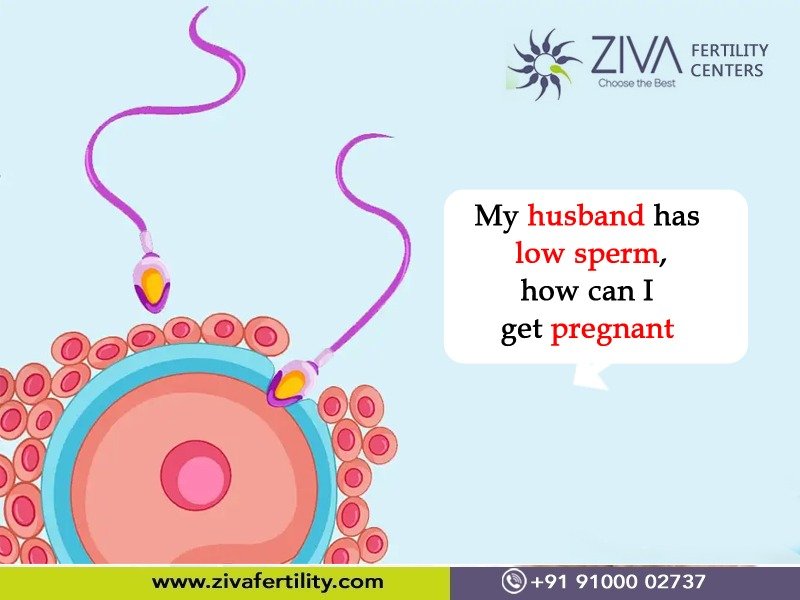Most men do not consider fertility evaluation until they are unable to father a child. This is more worrisome to the female partners since some husbands may not come forward to discuss these issues. So if you have questions such as – my husband has low sperm, how can I get pregnant? then this blog is for you. Low sperm count, medically known as oligospermia or oligozoospermia, is a common cause of male fertility problems and poses challenges to conceive naturally. But there is hope, and successful pregnancy is still possible, only it might take longer or require specific treatments or procedures. So, if your husband has a low sperm count, you can still get pregnant.
What are the causes of low sperm count in your husband?
If in 1 mL of semen, there are less than 15 million sperm, it is considered low sperm count.
- Sperm problems could be due to congenital issues, lifestyle choices, childhood infections, long-term sickness, medications, chromosome or hormone problems.
- Varicoceles, which are found in 16 out of every 100 men, have swollen veins in the scrotum that disrupt blood flow and can overheat the testes, lowering sperm production.
- Low hormone levels in the pituitary gland cause low sperm levels.
- Long-term usage of medications for arthritis, digestive problems, anxiety or depression, infections, high blood pressure, and cancer can cause low sperm count.
- In males suffering from sexually transmitted diseases such as Gonorrhea and chlamydia, the testicles swell, resulting in low sperm count.
- Klinefelter syndrome is where men have an extra X chromosome and is one of the most common chromosomal causes of male infertility.
- Injury to the testicles is common when hurt by force as they hang outside the body so that they can be damaged more easily.
- Hyperthyroidism can cause low sperm count.
- Obese patients and diabetics were associated with low sperm count.
- Environmental toxins such as insecticides, BPA, and some heavy metals have been associated with low sperm count.
- Cancer treatments can destroy sperm cells and the stem cells that make sperm.
How do sperm factors affect male infertility?
Getting pregnant with a low sperm count can be more complex, and it is only one factor in male fertility. Apart from low sperm count, other factors for male infertility are:
- Semen volume
- Sperm concentration
- Total motility – sperm movement
- Progressive motility – sperm direction of moving (straight line or a large circle)
- Vitality and sperm morphology – The size and shape of sperm.
My husband has no sperm; how can I get pregnant?

Yes !!! You can get pregnant even if your partner has a low sperm count. With proper treatment, lifestyle modification, or surgery, 23% of infertile couples conceive after two years, and 33% conceive after four years.
Diagnosis to determine sperm levels of your husband
- A semen analysis reveals complete information about all the aspects of the sperm. Blood tests are done to determine hormone levels in the blood, including testosterone, follicle-stimulating hormone (FSH), luteinizing hormone (LH), and prolactin.
- In rare cases, genetic and chromosomal testing, along with ultrasounds and biopsies, may be opted for.
These tests may reveal multiple findings, giving an insight into the issues with getting pregnant with low sperm count and motility.
Treatments (Medical and Non-Medical)
Modifications of Lifestyle:
- In any case, eating nutritious foods, exercising regularly, and maintaining everyday health are essential for overall health.
- Stop smoking, as it can further impair sperm production.
- Quit recreational drugs and limit alcohol intake.
- Do not expose yourself to environmental toxins and chemical environments.
- Do Not expose your scrotum to excess heat, especially from your laptops, as heat can affect testicle sperm production.
- Avoid hot tubs and tight-fitting underwear.
Medications: For a successful pregnancy, have sex during the woman’s fertile window. At-home ovulation testing can help you with timing. Seek treatment if you have erectile dysfunction and retrograde ejaculation (when the semen enters the bladder instead of exiting the penis). Both these conditions can positively impact low sperm count.
Surgery:
- Varicocelectomy, which means treating swollen varicoceles, can improve semen parameters in 60-70% of patients.
- Microsurgical vasovasostomy to reverse the vasectomy
- A vasoepididymostomy to treat epididymal blocks
- Transurethral resection of the ejaculatory duct or TURED
Assisted reproductive techniques (ART) such as:

IUI (intrauterine insemination) – During an intrauterine insemination (IUI) procedure, using a tiny catheter, sperm is placed directly into the uterus. IUI improves the chances of fertilization by increasing the number of healthy sperm that reach the fallopian tubes when the woman is most fertile.
IVF (in vitro fertilization) – In the IVF procedure, mature eggs are collected from ovaries and fertilized by sperm in a lab. After a few days, healthy embryos are formed. After careful embryo selection, they are placed directly in the uterus. This is the most successful procedure, and it works for both a partner’s sperm and a donor’s sperm.
IVF and ICSI (intracytoplasmic sperm injection) – This is a slight variation of IVF, where the sperm is injected into the egg in the lab for embryo formation. The rest of the steps are the same as the IVF procedure.
For the above ART, sperm must be retrieved using any of the below methods:
Testicular sperm extraction (TESE) – A small incision is made in the testis to examine the tubules for the presence of sperm. TESE can be done as a scheduled procedure or done in coordination with their female partner’s egg retrieval.
We at ZIVA have helped thousands of couples with low sperm count to realize their dream of a baby. We not only offer medical services but also provide counseling services to males who come with low sperm counts. For more information, please visit our website https://zivafertility.com/ or contact us at +91-9100002737 or +91-9392834024.


















